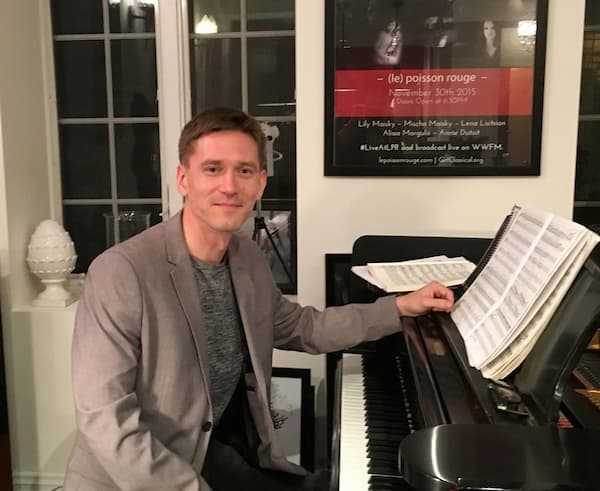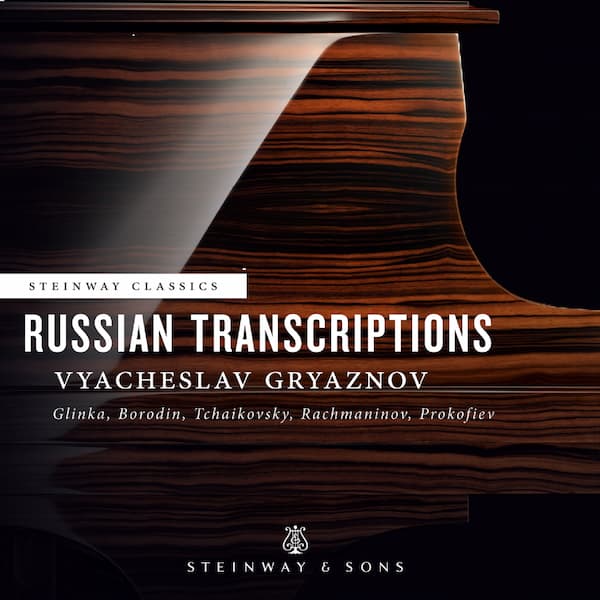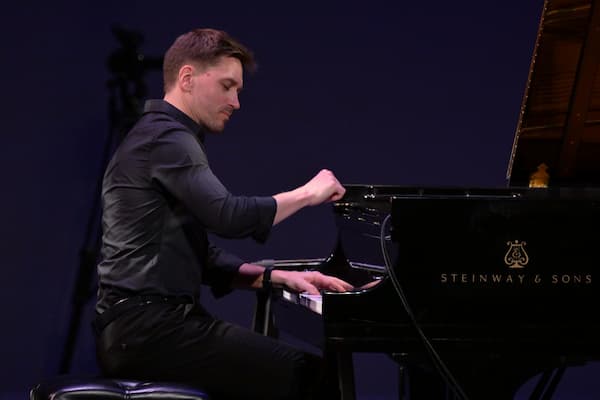The Russian pianist and composer Vyacheslav Gryaznov, born on 15 January 1982 in Yuzhno-Sakhalinsk in the former Soviet Union, is renowned for his extraordinary ability for virtuosic technique and expressive performances. Appearing at such venues as Carnegie Hall and the Royal Albert Hall, Gryaznov showcases a diverse repertoire ranging from classical to contemporary music, and that includes his own compositions.

Vyacheslav Gryaznov
His technical prowess is particularly evident in his brilliant piano transcriptions, and as a composer, he blends classical traditions with modern sensibilities. A recipient of several prestigious awards and recognitions, Gryaznov has solidified his place as one of the leading figures in contemporary piano performance.
Rachmaninoff
Vyacheslav Gryaznov Plays Rachmaninoff’s 10 Preludes, Op. 23
Gryaznov is known for his exceptional artistry as a pianist and his ability to bring unique interpretations to the works he performs. While his discography is not yet as extensive as some of the most commercially known pianists, his recordings are highly regarded for their technical skill, emotional depth, and distinctive interpretations. And such is the case with his recordings of Rachmaninoff’s piano works.

Vyacheslav Gryaznov
Gryaznov’s approach to Rachmaninoff is known for its richness of sound, which is particularly well-suited to the composer’s lush harmonies. He has the ability to extract a wide palette of tone colours from the piano, and he beautifully balances virtuosic technique and the deeply emotional quality of the music. Paying close attention to phrasing, Gryaznov shapes the music in a way that feels both natural and expressive.
Chopin
Vyacheslav Gryaznov Plays Chopin’s Ballade No. 1, Op. 23
Gryaznov’s interpretation of Chopin’s Ballades is noted for his dramatic intensity and emotional range. The G-minor Ballade is one of the pinnacles of Chopin’s piano compositions, combining lyrical moments with explosive technical passages. As Gramophone writes, “Gryaznov’s reading of Chopin’s Ballades is not just about virtuosity; it is the way he shapes each movement with impeccable control and a vivid emotional arc.”
Critics frequently highlight Gryaznov’s ability to inject his performances with a sense of musicality that goes beyond mere technical execution. His Chopin recordings across the board are often noted for their delicate phrasing and attention to tonal colour. A good many of his performances and recordings tend to lean toward the introspective and lyrical rather than the overtly showy.
Gryaznov Transcriptions

Alexander Borodin: String Quartet No. 2 in D Major – III. Notturno (arr. V. Gryaznov for piano) (Vyacheslav Gryaznov, piano)
For Gryaznov, the art of transcription is a genre that is an integral part of his creative life. As he explained, “It is an opportunity to interpret my favourite symphonic pieces not being a conductor, and to do it with this special psychology and subjectivity that are possible only in a solo performance.” It is also an opportunity to look at some well-known pages of the past “and feel modernity and novelty in them. I want to express this dialogue of epochs and styles.”
The process of creating any piano transcription is completely unique each and every time. “I very much enjoy this unpredictability,” he explains, “and love when a spontaneous idea comes into my mind and yields an absolutely new and fresh vision of the music with which I am working.” His transcription recordings are celebrated for their virtuosic complexity and the transformation of orchestral works into multi-layered solo piano pieces.
Mikhail Ivanovich Glinka: Valse-fantasie in B minor (arr. Gryaznov) (Vyacheslav Gryaznov, piano)
Schubert

Vyacheslav Gryaznov
Schubert’s Piano Sonatas are regarded as some of the most profound pieces in the piano repertoire. Gryaznov’s interpretation of D. 960 is celebrated for its emotional depth and restraint, skilfully balancing Schubert’s expansive musical ideas with the tenderness inherent in the work. In his performance, Gryaznov brings introspection to the first movement, emphasising the long, flowing lines and clear counterpoint.
His rendition of the Adagio is particularly moving, marked by subtle tempo shifts that create a meditative atmosphere. Critics, including The New York Times, have praised Gryaznov’s ability to draw out the lyricism of the piece without over-sentimentality, noting his strong grasp of both the emotional and structural elements, particularly in the Adagio, where his pacing enhances the melancholic beauty of the music.
Gryaznov’s social media activity aligns with his reputation as a deeply serious, introspective musician who values quality and meaningful engagement. He does grant glimpses into his life behind the scenes, including rehearsal footage, concert photos, and sometimes personal reflections on the music he is working on.
For more of the best in classical music, sign up for our E-Newsletter
